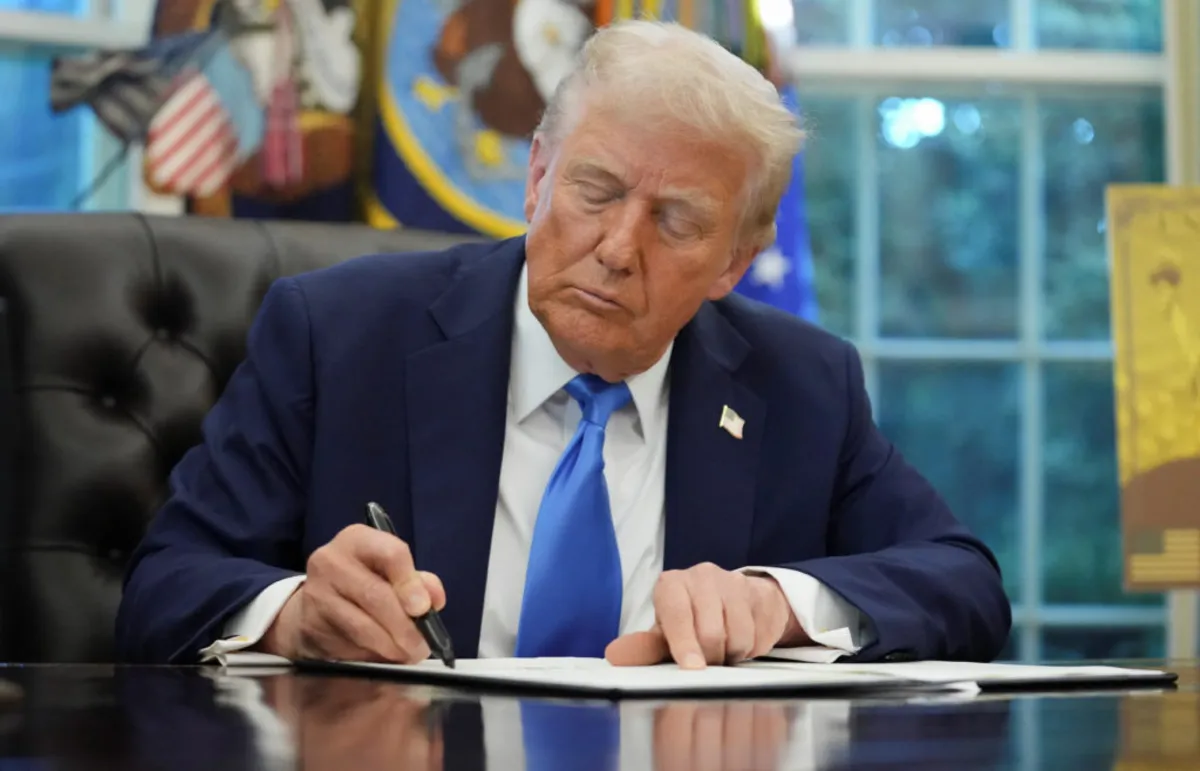
In a recent announcement, President Donald Trump has unveiled a significant change to the American immigration system that has left many immigrant workers in a state of confusion. On Saturday, the White House worked quickly to clarify that a newly imposed $100,000 fee on H-1B visas for skilled tech workers will apply only to new applicants, not to current visa holders. This proclamation was signed by Trump on Friday, alongside Commerce Secretary Howard Lutnick, and is designed to impact high-skilled jobs that technology companies struggle to fill.
White House Press Secretary Karoline Leavitt took to social media to reassure existing H-1B visa holders, stating, "Those who already hold H-1B visas and are currently outside of the country right now will NOT be charged $100,000 to re-enter." This clarification was crucial as the new fee took effect at 12:01 a.m. ET Sunday and is initially set to expire after one year, although it may be extended based on government assessments of its necessity for the United States.
The White House emphasized that this new regulation "does not impact the ability of any current visa holder to travel to/from the U.S." Despite these reassurances, immigration attorneys have voiced concerns that this policy change could disrupt the lives of many skilled workers and have extensive implications for American businesses.
Kathleen Campbell Walker, an immigration attorney from Dickinson Wright in El Paso, Texas, commented on LinkedIn that the White House's abrupt announcement “inserts total chaos in the existing H-1B process with basically a day’s notice.” While Lutnick indicated to reporters that the fee would be an annual obligation for companies, a White House official later clarified that it is a one-time fee, leading to further confusion.
India's government has also expressed apprehension regarding the fee increase, which could significantly affect the number of tech workers seeking visas to the United States. With over 70% of H-1B visa holders originating from India, the Indian Ministry of External Affairs stated that the Trump administration's move "was being studied by all concerned." They warned that this measure could have humanitarian consequences, particularly for families separated by immigration policies.
The H-1B visa program, which requires a minimum of a bachelor’s degree, is intended for high-skilled positions that tech companies find difficult to fill. However, critics argue that the program undermines American workers by attracting foreign talent willing to accept lower salaries, often around $60,000 annually, compared to the typical $100,000-plus salaries of U.S. tech workers.
Trump has claimed that the tech industry supports this initiative, with Lutnick asserting that “all big companies” are on board. However, representatives from major tech firms such as Amazon, Apple, Google, and Meta have not yet responded to inquiries regarding their stance. The U.S. Chamber of Commerce expressed concern about the implications for employees and American employers, indicating they are working with the Administration to assess the full impact.
Lutnick suggested that the new fee structure would likely result in a decrease in the number of H-1B visas issued annually, stating, “If you’re going to train people, you’re going to train Americans.” In addition to the H-1B changes, Trump has introduced a $1 million “gold card” visa for wealthy individuals and a “Trump Platinum Card” for $5 million, allowing foreigners to spend up to 270 days in the U.S. without incurring taxes on non-U.S. income.
While some advocates for American workers have applauded these changes, viewing it as a step towards abolishing H-1B visas, others warn that the implications of these policies could disrupt the tech industry and the economy as a whole. Doug Rand, a former senior official with U.S. Citizenship and Immigration Services, criticized the proposed fee increase as “ludicrously lawless,” arguing that it serves more as a political tactic than a practical immigration policy.
As the situation develops, the future of the H-1B visa program remains uncertain. Historically, H-1B visas have been distributed through a lottery system, with major corporations like Amazon being the largest recipients. Critics argue that many H-1B positions are filled by workers in entry-level roles rather than those requiring specialized skills, further complicating the narrative around skilled immigration in the U.S. As the administration moves forward with these changes, both immigrant workers and U.S. employers will be watching closely to see how this new policy unfolds.